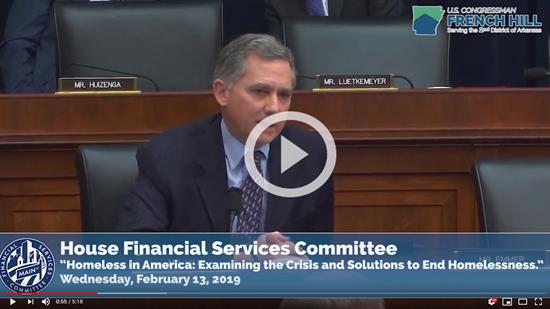Rep. Hill Highlights Successful Little Rock Homelessness Programs at Financial Services Hearing
Washington,
February 18, 2019
Tags:
Financial Services
It's been really rewarding work in our office. I've got four veterans on my constituent team, three of them are combat veterans and they spend time in our shelters really helping our vets. They deserve that extra touch and many of them are really lost in the morass of not only homelessness, but also the veteran programs that they might be eligible for. I thank my staff for that work. We've been a vigorous advocate for funding just in the last four years. We've gotten four million dollars in grant funding for our homeless nonprofits in Little Rock and they are using that money very wisely. I've been so impressed by their ability to take care of emergency transient housing, the person who loses their lease, that family in crisis, that more troubling chronic alcohol and drug addicted population, and then those who are really working their way back to self-sufficiency. The group works really well together and that's why I invited Ben Carson to Little Rock to see this work on the ground and see what's happening. He was really inspired by that work. We have one of our nonprofits, Our House, which would be a terrific group to lead the Envision Centers in our public housing. It’s an initiative of HUD and I hope to see that move forward. Whether it’s the Union Rescue Mission Dorcas House, St. Francis House, Jericho Way, Salvation Army, Gains, Lucie's Place, Women and Children First--I have been impressed, as a former business person, how well they work together, looking for that gap and filling it to help all those suffering from homelessness. I heard Mr. Lawson mention it, my friend from Wisconsin mentioned this issue of definitions. We have all these definitions that are different on homelessness. It's allowed the federal government to make claims about ending homelessness which I don't agree with. We had a celebration where the mayor of Little Rock said at an event last fall that we've ended veteran's homelessness. I'm thinking man, I can take you and introduce you to some right now that are homeless. So how do we get HUD and the VA on the same page on the definition about who is homeless? Ms. Olivia, you worked at HUD. So, we have these multiple definitions of homelessness. Is living in a hotel homeless? Ann Marie Oliva, Senior Policy Advisor, Corporation for Supportive Services: Well it depends. Rep. Hill: Well it really doesn’t. If they're in a hotel longer than a month, are they homeless? Ms. Olivia: So I would say again, there's a need because of the resources that are available to prioritize folks that are most vulnerable first for the housing resources that are available. I don't think that HUD and the VA are not on the same page--and Mr. Stewart might be able to address this based on something more recent--our work with the VA, our collaborative work with the VA and USICH around veteran homelessness in particular, was some of the best work that we did inside of the federal government. As far as I'm concerned, we were on the same page. We ensured that we were prioritizing chronically homeless veterans for the HUD VASH program for example. Until no veteran was on the street, then we could start working down the list. Homelessness prevention is a part of those programs that could work with those folks. Rep. Hill: And they do great work in that. Ms. Roman, talk to me about the vouchers that we have in section 8, how do we make sure that they really are clean and safe places? Is public housing authority really putting those housing vouchers out where they should be? Nan Roman, President and CEO, National Alliance to End Homelessness: Well I’m not an expert on section 8 but my understanding is that they do inspections on section 8 units. They are supposed to be clean and safe. I think in the homeless arena, we don't always have those kinds of inspections and you do have to be concerned about their quality. |



